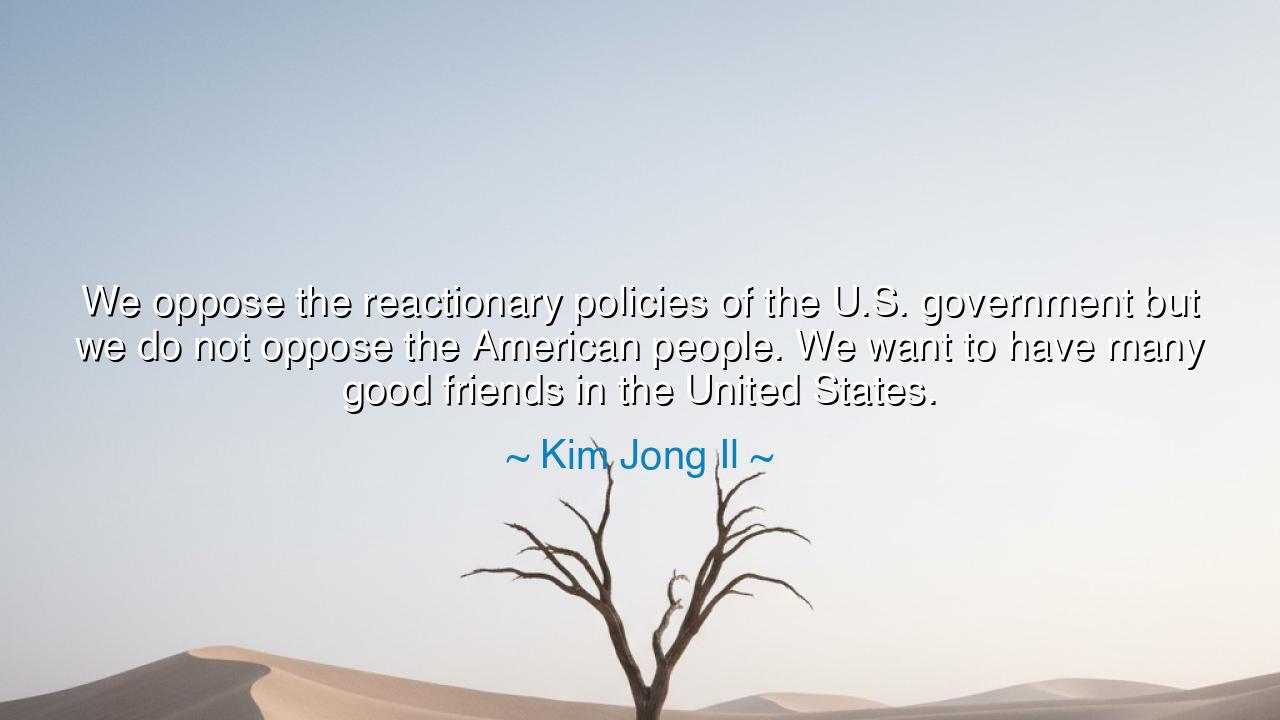
We oppose the reactionary policies of the U.S. government but we
We oppose the reactionary policies of the U.S. government but we do not oppose the American people. We want to have many good friends in the United States.






"We oppose the reactionary policies of the U.S. government but we do not oppose the American people. We want to have many good friends in the United States." – Kim Jong Il
In these guarded yet revealing words, Kim Jong Il, the late leader of North Korea, sought to draw a sharp line between the government and the governed—between policy and people, between hostility and humanity. His statement, layered with diplomacy and defiance, carries a dual message: opposition to what he saw as imperialist aggression, and a simultaneous yearning for recognition and connection. It is the voice of a ruler whose nation stood isolated from the world, yet who understood the enduring truth that even in enmity, nations are built of human hearts, not governments alone.
The origin of this quote can be traced to the long and bitter history of tension between North Korea and the United States, particularly after the Korean War (1950–1953). For decades, both countries existed in a frozen hostility, their peoples separated by ideology, propaganda, and fear. Yet Kim’s words—spoken during diplomatic overtures in the late 20th century—reflect the attempt to soften that hostility, at least in form. They suggest an understanding that political conflict must not annihilate the possibility of human friendship. In essence, Kim sought to portray North Korea’s struggle not as hatred toward America itself, but as resistance to domination. It was, in his view, a war of systems, not souls.
Beneath the surface of this statement lies a profound paradox. Kim Jong Il was the head of a government notorious for repression, yet his words touch upon a universal principle: that individuals are not their governments. This distinction has often preserved humanity amid the chaos of conflict. During the Cold War, countless Americans and Soviets—despite being told to despise each other—found common ground through art, science, and even space exploration. When U.S. astronaut Thomas Stafford clasped hands with Soviet cosmonaut Alexei Leonov in the Apollo-Soyuz mission of 1975, they embodied this very truth: that while governments may war, people can still reach across the void of ideology.
Kim’s statement, though born of politics, carries a timeless wisdom about empathy in the face of division. To oppose policy is not to despise a people. Indeed, the moment we equate a government with its citizens, we abandon fairness and compassion. History has shown how easily hatred can grow when this distinction is lost. In times of war, propaganda thrives on dehumanization. But the wise remember that behind every uniform and flag beats a human heart—capable of fear, hope, and kindness. Kim’s remark, whether strategic or sincere, acknowledges this: that peace begins not between governments, but between people who refuse to see one another as enemies.
There is also a subtle warning in his words. By claiming to oppose “reactionary policies,” Kim was signaling that policy, when blind to understanding, breeds perpetual resistance. Many leaders throughout history have fallen into the trap of confusing power with wisdom, force with persuasion. But no nation can dominate the spirit of another indefinitely. Even empires collapse when they fail to win hearts. The same principle applies in all human affairs: whether between nations, neighbors, or families, reconciliation demands recognition of shared humanity, not the triumph of pride.
The lesson, therefore, is clear: one must learn to separate opposition from hatred, resistance from cruelty. To reject an idea is not to reject the soul who holds it. Great civilizations have endured because they learned to debate fiercely yet respect deeply. It is the sign of maturity—political and moral—to see the dignity in one’s adversary, even when their path diverges from one’s own.
And so, the practical actions are these: in your own life, when you face conflict, do not reduce others to symbols of opposition. Seek understanding before judgment. Defend your beliefs, but never dehumanize. Remember that friendship, even across hostility, is the seed of peace. For as Kim Jong Il—perhaps unintentionally—revealed, the fate of nations, and of humanity itself, depends not only on power or policy, but on the capacity of people to see one another beyond the shadows of their governments.






AAdministratorAdministrator
Welcome, honored guests. Please leave a comment, we will respond soon